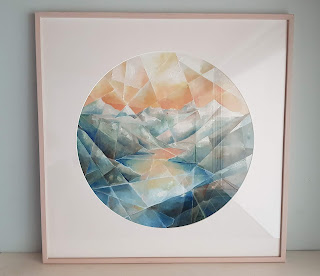Art is a luxury you CAN afford
 |
| Abbie Matthews - "Dusk" 2018 |
I have
exciting news! I’ve purchased an original artwork by my friend and local artist
Abbie Matthews. I bought this beautiful painting at her opening night and have
been eagerly waiting for it to join my collection ever since. As I have
reclaimed my inner artist in recent years, I have also gained the desire to
collect art from others. This is not a hoity-toity collection for investment
(if you want advice on that I suggest you go elsewhere). My collection is a
personal collection of works I love, by artists I wish to support.
Art is
often seen as a luxury item. Most people like art but are not willing to pay
for an original. At galleries, markets or other venues I’ve often heard ‘I love
this but I can’t afford it’ or ‘$500!? For that!?’ The average
person doesn’t understand the cost behind an artist’s work (the materials, the
hours, framing, possible studio or venue hire to exhibit etc.) and so doesn’t
understand the price tag. Abbie, as an example, was happy that she made back
the money for her framing bill through a few sales. ‘Goals of an artist,’ she joked,
‘to break even!’
How an item
is priced is not what I want to go into today, but I just want to point out
that most artist’s work is very reasonably priced, especially if they are local
and emerging. Outrageous price tags come in once the artist is established and
the market is driving their prices. The average artist/buyer is not in this ball
game.
It saddens
me that people say they can’t afford art but tech gadgets such as the latest
iPhone or game console are commonplace in their homes. These items cost more
than a lot of artworks but are seen as
essentials in our technology-driven world. What's even more frustrating is gadgets devalue very quickly and become e-waste, while art holds or increases in value and can last a lifetime. It seems the issue is how we prioritise our money. Artworks are seen as non-essential because they don’t have a
practical purpose. I am arguing that buying art does have a purpose, for the
buyer and the artist.
1. What you get
When it comes down to it, we want to get something for our money. Art is
not as practical as food, clothing or furniture, but art goes beyond the mere
decorative. Art is soul-enriching. It’s inspiring. It relaxes us or stimulates
us. Good art will speak to us and invite us to have a relationship with it. It
can start conversations. It can boost our own creativity. We know it can have a
profound impact on our health and wellbeing. This is the art that you should acquire
for your collection. What art gives you can be subtle, but don’t mistake it for
being a passive object.
2. What you give.
For me, this is the more important part of the equation. The makers and
crafters movement started at the turn of the century. People are turning away from
commercialism and going back to local, sustainable small business because it keeps money in local economies. It’s time we
all support local artists and crafters! Artists make their money through sales.
Yes, you can buy a cheap print at Kmart but I argue it won’t have the same
soul as a hand made work, and your money could be going to supporting someone who needs it more. If
we want to value our artists and demolish the ‘starving artist’ myth then we
need to put our money into our local artists. This changes the story we have in
our society about the value of art.
3. Alternatives
Art is everywhere and cheap original artworks can be purchased at local
markets and fairs. I recently bought a lovely brooch by Leversha Design at Clunes
Maker’s Market. Art students may also be a good option for you. I have recently
bought one of my student’s works for only $15! Far underpriced I believe, but students are willing to let go of their art at very reasonable prices because they are just starting out. If you can’t afford an artist’s original
that you love, maybe a print is available for purchase. It’s possible you could afford a commission of
the original work on a smaller scale. For a practical option, head on over to
Redbubble. You can get artists’ original designs printed on quality t-shirts (or
mugs and other things).
Whatever
your budget, you can afford to buy art. Don’t think collecting art is for
elitists. Buy what you love and support local artists!
Until next
time,
Erin


Comments
Post a Comment